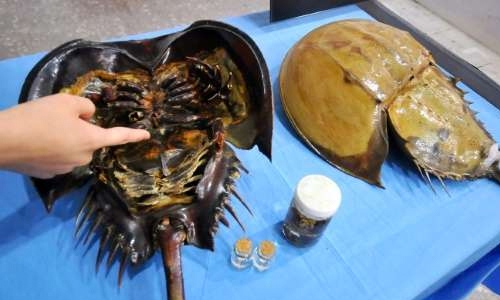'Living fossil' crabs mysteriously dying in Japan
Tokyo : Hundreds of horseshoe crabs -- known as "living fossils" as they are among the earth's oldest creatures -- have washed ashore dead in southern Japan, confounding experts who study the alien-like sidewalkers.
Horseshoe crabs, known for their blue blood, are a regular summer visitor to tidal flats in south and western Japan including one near Kitakyushu city where they lay their eggs.
Some invariably die in the process, but this year a local conservation group noticed that the number of the precious marine arthropods that perished was unusually high, a local official told AFP on Thursday.
"The conservation group spotted about five to 10 remains every day during the egg-laying period, so they started to tally them," said Kitakyushu city official Kenji Sato.
"In total the number of dead horseshoe crabs reached about 500," Sato said.
The Asahi Shimbun daily reported that the amount of dead crabs was eight times higher than normal.
Sato said that local officials have sought guidance from experts but that so far a consensus on what caused the unusually high number of deaths this year has proved elusive.
A number of academics, however, point to "oxygen shortage due to higher sea water temperature, or parasite infestation or a disease peculiar to horseshoe crabs" as a possible cause, he added.
Japan's environment ministry designates the helmet-like crabs as an "endangered species" as its population has declined sharply due to coastal habitat destruction in tandem with Japan's economic development.
But there is no legal obligation to take concrete measures to protect the species, an environment ministry official said.
The horseshoe crab -- "kabutogani" in Japanese, meaning literally "warrior helmet crab" has survived for 200 million years.
Enthusiasts established the Japan Horseshoe Crab Association in 1978, which counted up the dead creatures this summer, according to local officials.
"The biology of the horseshoe crab is still a mystery and we don't know much about it," Sato said.
Related Posts

